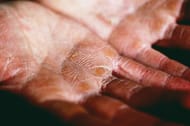Dry skin is a condition that can be caused by various factors. Understanding the common causes of dry skin is essential for effectively preventing and managing this condition. By identifying the root causes, you can implement appropriate measures to keep your skin hydrated and healthy.
Let's explore the common causes of dry skin and discuss effective prevention strategies.
Common Causes of Dry Skin

Here are the most common causes of dry skin:
1) Environmental Factors: Environmental conditions play a significant role in skin hydration. Low humidity levels, particularly during winter months or in dry climates, can strip the skin of its natural moisture, leading to dryness. Exposure to harsh weather conditions, such as cold winds or excessive sun exposure, can also contribute to dry skin.
2) Hot Showers or Baths: While a relaxing hot shower or bath may feel soothing, prolonged exposure to hot water can strip the skin's natural oils, resulting in dryness. Hot water can disrupt the skin's barrier function and cause moisture loss. It's therefore advisable to limit your shower or bath time and use lukewarm water instead of hot water.
3) Harsh Skincare Products: Some skincare products contain harsh ingredients, such as alcohol, fragrances, or certain detergents, which can strip the skin of its natural oils and disrupt its moisture balance. Using such products can lead to dryness and irritation. Opt for gentle, fragrance-free products that are formulated for dry or sensitive skin to prevent further dryness.
4) Aging: As we age, the skin's ability to retain moisture decreases. The production of natural oils and hydration levels decrease, leading to drier skin. Aging skin requires additional hydration and moisturization to maintain its suppleness and prevent dryness.

5) Underlying Medical Conditions: Certain medical conditions can contribute to dry skin. Eczema, psoriasis, hypothyroidism, and diabetes are examples of conditions that can cause dryness and skin-related issues. If you suspect an underlying medical condition, it's crucial to consult a healthcare professional for proper diagnosis and treatment.
Prevention Strategies for Dry Skin

1) Moisturize Regularly: The most effective way to prevent dry skin is to moisturize regularly. Choose a moisturizer that is specifically formulated for your skin type and contains hydrating ingredients such as hyaluronic acid, glycerin, or ceramides. Apply moisturizer immediately after bathing or showering to lock in moisture.
2) Use Gentle Cleansers: Avoid harsh soaps or cleansers that can strip the skin of its natural oils. Opt for mild, fragrance-free cleansers that are gentle on the skin. Be mindful of over-cleansing, as washing the skin too frequently can further dry it out.
3) Humidify Your Environment: Use a humidifier in your home, especially during the winter months or in dry climates. Humidifiers add moisture to the air, helping to prevent excessive dryness in your surroundings and, consequently, on your skin.
4) Limit Hot Water Exposure: As mentioned earlier, hot water can be detrimental to the skin's moisture balance. Take shorter showers or baths using lukewarm water instead of hot water. Pat your skin dry gently with a towel rather than rubbing vigorously.

5) Protect Your Skin from the Elements: Shield your skin from harsh weather conditions. During cold weather, wear warm clothing, gloves, and scarves to protect your skin from cold winds. In sunny weather, use sunscreen with a broad spectrum to prevent sun damage and apply a moisturizer with SPF for added protection.
6) Stay Hydrated: Hydration starts from within. Drink an adequate amount of water throughout the day to keep your body and skin hydrated. Aim for at least eight glasses (64 ounces) of water daily, or adjust your intake based on your activity level and climate.
7) Choose Skincare Products Wisely: Read the labels of skincare products carefully and avoid those that contain harsh ingredients. Look for products labeled "hypoallergenic," "fragrance-free," or "suitable for sensitive skin." Natural, organic, and plant-based products can also be gentle on the skin and help prevent dryness.
8) Wear Proper Clothing: When it comes to preventing dry skin, your clothing choices matter. Opt for breathable fabrics like cotton or silk, which allow your skin to breathe and reduce the risk of irritation. Avoid rough or scratchy fabrics that can aggravate dry skin and choose loose-fitting clothing to minimize friction.

9) Maintain a Healthy Lifestyle: Your overall lifestyle habits can influence your skin's health. Adopting a balanced diet rich in fruits, vegetables, and healthy fats can nourish your skin from within. Regular exercise promotes healthy circulation, which is beneficial for skin health. Avoid smoking and limit alcohol consumption, as these can dehydrate the skin and worsen dryness.
10) Seek Professional Help: If your dry skin persists despite implementing preventive measures, it's advisable to consult a dermatologist or skincare professional. They can assess your skin condition, identify any underlying causes, and recommend appropriate treatments or prescription medications to manage dryness effectively.
Understanding the common causes of dry skin is the first step in preventing and managing this condition. By addressing environmental factors, adjusting your skincare routine, and adopting healthy habits, you can maintain your skin's natural moisture balance and prevent dryness.
Remember to moisturize regularly, use gentle products, and protect your skin from harsh elements. Embracing these preventive strategies will help you achieve and maintain hydrated, healthy, and radiant skin.
